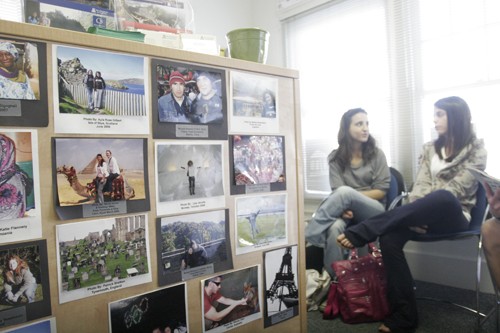Despite the slumping economy, the UA’s study abroad program is sending about 2,200 students abroad this year.
Kirk Simmons, executive director of International Affairs, said he found that students are taking advantage of financial aid and making study abroad a priority.
“”I’ve been surprised at the robust enrollment in our program given the fact that we are a public university and that we have a majority of our students on financial aid,”” Simmons said.
Study abroad at the UA consists of 150 programs in 50 countries led by 170 of the UA’s own faculty members, and is ranked among the top 20 programs in the nation.
There are two different methods of studying abroad available to students at the UA. Students can choose to participate in a one-way study abroad, and the university hosts exchanges between non-degree seeking students. This means that a student from another country swaps places with a UA student and each pays their home school’s tuition.
“”Studying abroad is a time of self-discovery,”” Spanish and geography senior Louise Campoy said. “”When you’re taken out of your comfort zone, you have two choices: remain secluded and withdrawn, or adapt. If you choose the latter, you learn so many things about yourself and life in general.””
Student demand for study abroad varies greatly, according to Simmons. Traditionally, English-speaking countries are the most popular places to study, along with western European countries, but this is changing as the demand for programs in countries in Asia and Africa increases.
“”Students are much more sophisticated and are electing to study in non-traditional parts of the world,”” Simmons said.
Simmons said that outside of English-speaking countries, the highest number of U.S. students study in Italy and the highest number of UA students choose Spain. This is most likely because many students at the UA study Spanish.
“”I think that, most importantly, students are very astute about the need for international experience if they are to be successful in their professional careers,”” Simmons said.
David Wright, director of study abroad and student exchange, said studying abroad makes students very marketable when looking for a job after college because employers want people who are academic but who also possess skills related to “”cross-cultural critical thinking.”” These critical thinking skills are acquired when students are immersed in the varyious cultures of the places they study.
“”It’s hard to argue that you have global competency skills when you’ve never been abroad,”” Wright said. “”It’s a form of professional development.””
“”Not everyone has on their resume that they have studied abroad, so it definitely can set you apart from other job (or) graduate school candidates,”” business economics senior Alex Lange said.
Lange studied and interned abroad in London. She said she primarily worried about finding an affordable program that offered credits toward her major and didn’t delay graduating on time.
“”When I learned about the Eller London Internship program … I wasn’t worried about falling behind,”” Lange said, “”In fact, the program helped me stay on track to graduate on time.””
Lange says her parents funded the cost of the program she chose and she paid for other expenses, such as food and shopping, while she was abroad.
Students can go online to the UA’s study abroad Web site to compare the cost of the program they’re interested in with the cost of living in Tucson and attending school at the UA. According to Wright, many comparisons will end up showing similar costs for both situations.
“”If you’re planning your study abroad program a year in advance, it’s very likely that it’ll be a lot easier to fund it,”” Wright said.
While student interest in study abroad has increased, there are declining numbers in international student enrollment at the graduate level. International students are those from other countries who are here seeking a degree. Most of the UA’s international students come from China, India or the Middle East. Simmons calls this decline “”troubling”” because “”they’re a tremendous resource for the research engine of the university.””
The International Affairs department, which is responsible for overseeing all agreements and institutional partnerships with universities worldwide, has recently developed a program called “”UA Recruits.””
“”We’ve established a campus-wide coordinating committee for the recruitment of international students,”” Simmons said.
The UA is also partnering with the Alumni Association and the University of Arizona Foundation to focus on the development of international alumni relations.
“”We’re seeing a tremendous amount of momentum in connecting with our alumni for recruitment and making those connections worldwide,”” Simmons said.
He says the university has not historically had a coordinated effort directed toward international alumni but that there are tens of thousands of alumni worldwide that the university can make deeper connections with.
The UA will offer 10 new study abroad programs for the 2010-2011 school year led by various faculty members. Program development, according to Wright, begins with faculty.
“”The faculty come to us and let us know what is important to their work and their students,”” Wright said.
“”I love knowing other people and cultures,”” Campoy said, “”Studying abroad is a once-in-a-lifetime experience, and it’s something I’ve always dreamed about doing.””









